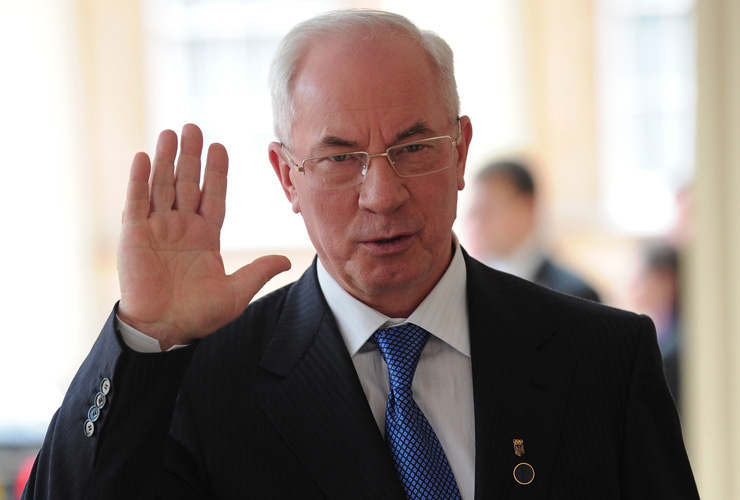Ukrainian prime minister Azarov offers resignation
Parliament repeals anti-protest laws that sparked violent clashes between protesters and police

A free daily email with the biggest news stories of the day – and the best features from TheWeek.com
You are now subscribed
Your newsletter sign-up was successful
THE prime minister of Ukraine, Mykola Azarov, has offered his resignation following a wave of deadly protests across the country.
In a statement published today, Azarov said: "I have taken a personal decision to ask the president of Ukraine to accept my resignation from the post of prime minister with the aim of creating an additional possibility for a political compromise to peacefully resolve the conflict."
Under the constitution, the departure of the prime minister means the resignation of the entire government. Azarov's resignation has yet to be accepted by the president, but that appears to be only a formality.
The Week
Escape your echo chamber. Get the facts behind the news, plus analysis from multiple perspectives.

Sign up for The Week's Free Newsletters
From our morning news briefing to a weekly Good News Newsletter, get the best of The Week delivered directly to your inbox.
From our morning news briefing to a weekly Good News Newsletter, get the best of The Week delivered directly to your inbox.
It came just hours before the Ukrainian parliament repealed the anti-protest laws that sparked the latest round of demonstrations in the capital city of Kiev. The decision was made today at an extraordinary session aimed at easing the crisis.
At least four activists have died in incidents connected with the protests in recent days, with the unrest spreading across Ukraine.
The anti-protest laws, which were passed on 16 January, banned the wearing of masks or helmets at demonstrations, and also outlawed unauthorised tents in public areas. Anyone blockading public buildings or slandering government officials also faced punishment under the legislation.
Despite today's significant concessions to the protesters, several key issues remain unresolved, says The Guardian. This includes the opposition's repeated demands for President Viktor Yanukovych to resign and a new election to be held.
A free daily email with the biggest news stories of the day – and the best features from TheWeek.com
The original protests began in November after Yanukovych refused to sign an Association Agreement with the European Union at the Eastern Partnership summit in Lithuania in November, derailing three years of talks with the EU.
Protesters argued that by refusing to loosen ties with Russia, Yanukovych was denying Ukraine the economic and social benefits of a relationship with the EU.
-
 Political cartoons for February 21
Political cartoons for February 21Cartoons Saturday’s political cartoons include consequences, secrets, and more
-
 Crisis in Cuba: a ‘golden opportunity’ for Washington?
Crisis in Cuba: a ‘golden opportunity’ for Washington?Talking Point The Trump administration is applying the pressure, and with Latin America swinging to the right, Havana is becoming more ‘politically isolated’
-
 5 thoroughly redacted cartoons about Pam Bondi protecting predators
5 thoroughly redacted cartoons about Pam Bondi protecting predatorsCartoons Artists take on the real victim, types of protection, and more
-
 Putin’s shadow war
Putin’s shadow warFeature The Kremlin is waging a campaign of sabotage and subversion against Ukraine’s allies in the West
-
 Epstein files topple law CEO, roil UK government
Epstein files topple law CEO, roil UK governmentSpeed Read Peter Mandelson, Britain’s former ambassador to the US, is caught up in the scandal
-
 Iran and US prepare to meet after skirmishes
Iran and US prepare to meet after skirmishesSpeed Read The incident comes amid heightened tensions in the Middle East
-
 Grok in the crosshairs as EU launches deepfake porn probe
Grok in the crosshairs as EU launches deepfake porn probeIN THE SPOTLIGHT The European Union has officially begun investigating Elon Musk’s proprietary AI, as regulators zero in on Grok’s porn problem and its impact continent-wide
-
 Israel retrieves final hostage’s body from Gaza
Israel retrieves final hostage’s body from GazaSpeed Read The 24-year-old police officer was killed during the initial Hamas attack
-
 China’s Xi targets top general in growing purge
China’s Xi targets top general in growing purgeSpeed Read Zhang Youxia is being investigated over ‘grave violations’ of the law
-
 Panama and Canada are negotiating over a crucial copper mine
Panama and Canada are negotiating over a crucial copper mineIn the Spotlight Panama is set to make a final decision on the mine this summer
-
 The rise of the spymaster: a ‘tectonic shift’ in Ukraine’s politics
The rise of the spymaster: a ‘tectonic shift’ in Ukraine’s politicsIn the Spotlight President Zelenskyy’s new chief of staff, former head of military intelligence Kyrylo Budanov, is widely viewed as a potential successor